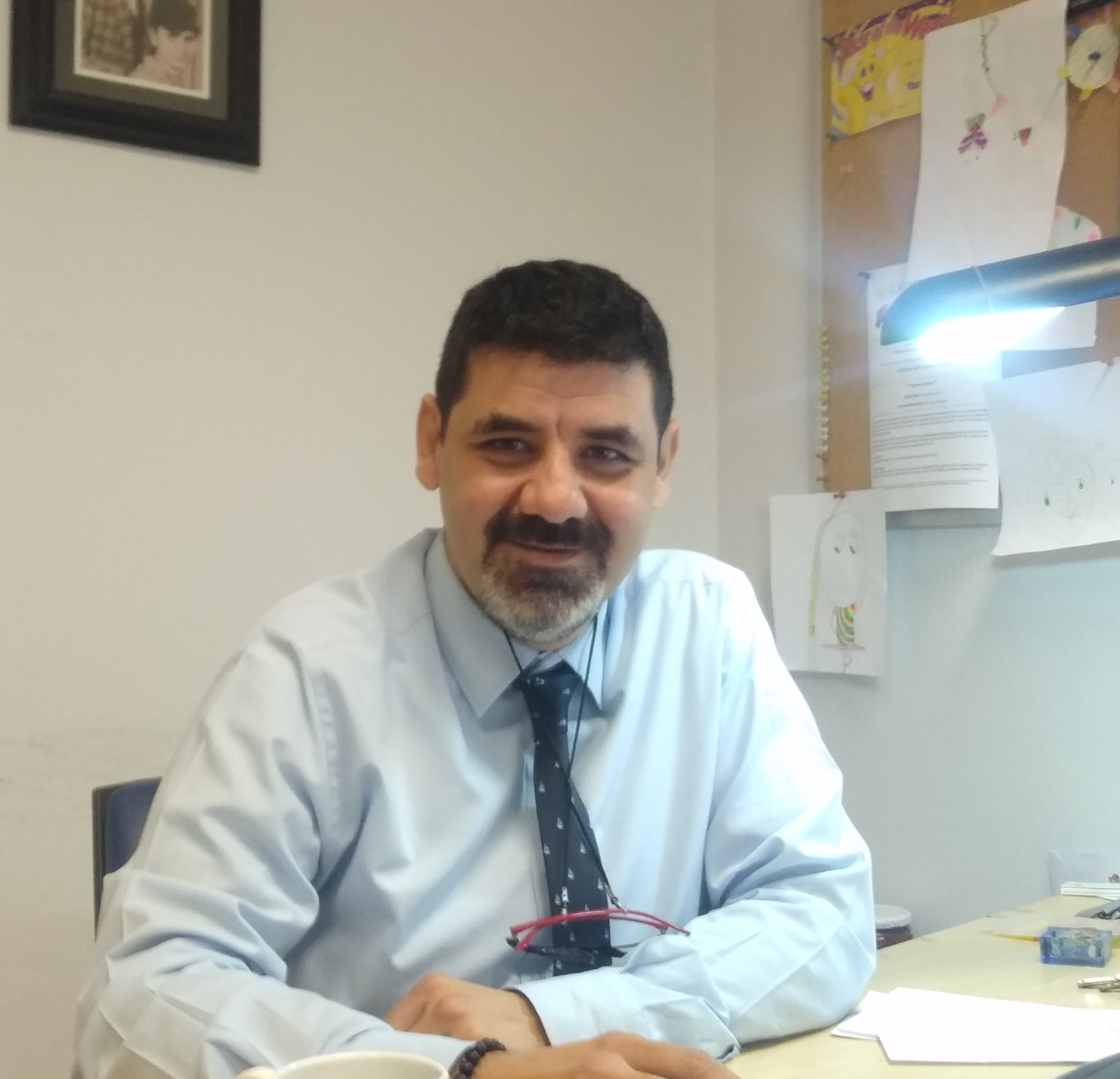
Assoc. Prof. Dr. Çağrı Levent USLU
Head of Department
e-mail: cluslu@yeditepe.edu.tr
Inline: 1751
Office: İİBF 503
Yeditepe Economics is a 4-year program that accepts students with TM-1 score type and the language of instruction is English. In the first year of the program, students are given courses that are the basis of Social Sciences. The main courses are Atatürk's Principles and History of Turkish Revolution, History of Civilization, and Law. In addition to these courses, Fundamentals of Microeconomics and Macroeconomics and Introduction to Mathematics, Accounting and Business Administration courses, which will form the basis for the advanced stages of Economics education, are also included in the first year. In addition, there is an applied laboratory course in Statistical Package Programming and Data Compilation in the first year to introduce students to the field of data science. In the 2nd and 3rd years of the program, there are theoretical Economics courses as well as Scientific Research Methods, Statistics, Econometrics and elective courses that students can take according to their interests/specialties. The 4th year of the program includes an education program consisting mostly of elective courses, where students can direct their education according to their areas of specialization. In the 4th year of the program, when the students are about to start their professional life, it is aimed to provide students with research skills and practical experience with the compulsory graduation project and internship courses.
In order for our department graduates to become individuals who make a difference in the developing global competitive environment, we provide opportunities for our students to develop themselves in their areas of interest / expertise. In this context, there are 2 different groups of elective courses in the academic program of the department. These courses constitute 27% of the department course load.
- Free Elective Courses: There are 6 free elective courses in the academic program. These courses can be chosen from any department at Yeditepe University. University elective courses can also be chosen instead of the Economics Department Area elective courses. If the course you want to choose is not on the list, the course you want can be added to the list as a result of a written application to the department until 2 weeks before the semester starts.
- Departmental Elective Courses: There are 7 departmental elective courses in the academic program and these courses consist of elective courses offered by the Department of Economics. The courses in the departmental elective list can also be selected as free elective courses.
Yeditepe Economics students have the opportunity to Double Major or Minor in many departments of the university. In this way, if they wish, students can graduate with two diplomas by studying the second department they prefer, or they can get an additional certificate to their diploma by doing a Minor in the department they prefer.
Students who graduate from Yeditepe Economics will be able to take part in government institutions, the private sector, especially in the Banking / Finance sector, and in the business world as entrepreneurs, as well as acquiring the basic knowledge and skills they will need in any Social Science branch they want to advance with their Master's and PhD education.

As a graduate of Yeditepe economics, I would like to say that it is a nice privilege to study at Yeditepe. It is even more privileged to study economics. The biggest blessing of graduating from this department was to be able to think analytically, to see details and to analyze people well.Because economics should not be seen only as economics, economics is also a human science. Throughout our faculty life, every sentence starting with assume that was engraved in my head, thanks to those assumptions, I have always had alternative plans in my life, and in fact, no matter how much numerical and statistical data we see, I better understood how much life we learn with real life, that is, after graduation.After graduation, I worked in the fields of accounting and finance. In my SME consultancy company, which I established in 2018, I provide SME, SGK and investment incentive consultancy.
Dila Olgun
2016 Graduate
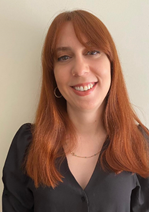
Hello, I'm Simge Tabak, I work as a Digital Manager at OMD Turkey Media Agency. The biggest advantage of Yeditepe University Economics Department is its international education approach in many fields and its expert academic staff. I graduated from the Department of Economics with many valuable achievements such as the quality of education that enables analytical thinking rather than rote learning, the English language of education, the wide environment it provides, the importance given to research and development, the fact that all teachers always help and listen to their students, provide a vision for the future, and prepare them for business life. From the first day I started with the preparatory class in 2010 until I graduated with beautiful memories, I have always been proud to be a Yeditepe University student and felt lucky. If I were to choose a university again today, I would choose the same school and department again.
Simge Tabak
2015 Graduate

Hello, I am Mert Berkant ZENGİN. I graduated from Yeditepe Economics Department in 2015. Since 2014, I have been the owner of Essen Reklam, a company that sells outdoor advertising materials. Although we are a small company in terms of the number of employees, we are among the top 10 companies in our field. We bring more innovative approaches to our field and this makes us one of the most innovative companies in the sector.
The courses I took during my undergraduate studies helped me take more confident steps in company management. The support I received from my professors allowed me to carry out both school and work in parallel for the last two years. Another opportunity Yeditepe provided me was the opportunity to play basketball, which I have been playing professionally since I was 11 years old, and to meet the parquet again with the school team after my injury. Because of my success in the school team, I got the chance to study with a 50% scholarship.
At school, I not only made long-lasting friendships but also established strong relationships with my teachers. The vision of being a person of the world that I received from the school has enabled me to establish both social and professional relationships from different countries.
Mert Berkant ZENGİN
2015 Graduate

I am Yeşim Dağdelen. In 2007, I enrolled in the Department of Economics at Yeditepe University with a full scholarship. I studied the department with great pleasure. The department I studied at Yeditepe offered me more than I imagined. My professors and the courses I took contributed greatly to my self-development and vision.
As soon as I graduated from school, I started working in the audit department at KPMG Turkey. After three years of auditing, I had the opportunity to have a different experience in the Decision Support Department at Türk Telekom and I have been continuing my business life at Türk Telekom for about 6 years.
Yeditepe University has added a lot of beauty to my life socially as well as academically. It gave me very valuable friendships that still continue. I had my dream Erasmus experience at Yeditepe and improved myself both academically and socially in a foreign country.
Even years later, when I remember Yeditepe, I feel very special and beautiful emotions. It is a very precious and unforgettable memory for me.
Yeşim DAĞDELEN
2012 Graduate
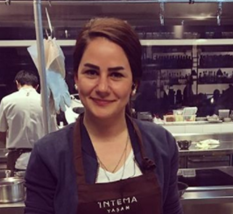
Hello, I am Tuba. I graduated from Yeditepe University, Department of Economics. I chose this department primarily because I had a very indecisive structure. The fact that there were highly qualified working areas where I could work after graduation made me feel safe.
As a matter of fact, after graduating from school in 2015, I worked at Lanxess Kimya Tic. Ltd.Şti., a Germany-based manufacturer of chemical raw materials, as a Sales Support Specialist (Currently)
Since it was a foreign company, the quality of my school and the level of foreign language education I received at Yeditepe University were the first factors that influenced the job interview.
In addition, the level of education I received improved my analytical intelligence and played an important role in my professional life. Thank you Yeditepe for all you have contributed to me.
Tuba ŞİMŞEK KOÇAL
2015 Graduate

The image of Yeditepe University in professional life enabled me to reach my goal easily in my job search process. I am currently working as a Senior Consultant at the independent audit company PwC - PricewaterhouseCoopers. I met this company, which I am happy to be an employee of, as a result of the recommendations of my department lecturers. Thus, I started my career in a leading and global company. I am always proud to be from Yeditepe.
Betül DEMİRKOL
2018 Graduate
Economy refers to all the activities that people do in order to sustain their lives such as production, consumption, trade, distribution, import and export. The Department of Economics, on the other hand, aims to train individuals who can analyze the Turkish and world economy from a broad perspective by teaching students the logic of economic science. In order to be a student of the Department of Economics, it is necessary to graduate from the equal weight departments of high schools and make the university choice from TM-1 score type. Students who successfully complete 4 years of education receive a bachelor's degree in economics. Yeditepe University Department of Economics provides an efficient education with its expert academic staff to students who want to pursue an academic career and who want to work in private or public organizations.
Yeditepe University Department of Economics provides students with the knowledge and experience to interpret the Turkish and world economy. The courses of the Department of Economics aim to provide students with an analytical perspective. In addition to quantitative courses such as statistics, mathematics, and econometrics, courses such as History of Economic Thought, Turkish Economy and Public Finance aim to provide students with a thorough understanding of systematic and critical thinking. After graduation, students of the Department of Economics can continue their graduate education and pursue an academic career or start a professional career in the public and private sectors.
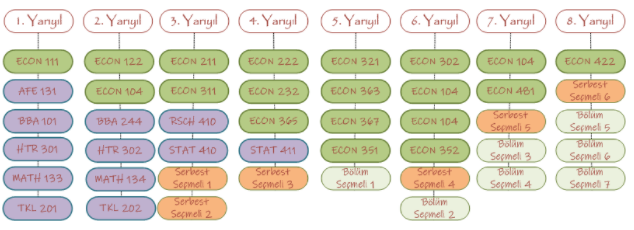
| Score Type | General quota | Minimum Score | Ranking |
| EA - Full scholarship | 7 | 485,04232 | 1990 |
| EA - %50 scholarship | 32 | 307,82825 | 359867 |
| EA - Non-scholarship | 5 | 289,91623 | 488143 |
| EA - UOLP Western Canada Huron University at Western Double Diploma program | 5 | 281,91711 | 555301 |
You can be informed from this page for Yeditepe University Faculty of Economics and Administrative Sciences Department of Economics fees.
Yeditepe University supports its students with various scholarship programs such as success scholarship, managerial scholarship, and athlete scholarship. You can get detailed information about scholarship opportunities by reviewing the Department of Economics Scholarship Opportunities page. You can access the relevant page here and review the departments and scholarship opportunities.
The main objective of Yeditepe University Economics undergraduate program is to train economists who can analyze economic developments in Turkey and the world and their socio-cultural consequences, analyze economic problems from an analytical point of view, have critical thinking and ethical values. In the curriculum of the Department of Economics, in addition to the basic knowledge of economics, a wide range of courses that support other fields of social sciences provide the development of students as a good economist. At the same time, students are offered the opportunity to study in two different fields such as Macroeconomics and Microeconomics, in which they can specialize in line with their interests. Yeditepe University provides compulsory internship opportunities for at least 40 working days to the students of the Department of Economics.
Before starting their professional careers, students have the opportunity to work in financial institutions to closely experience the knowledge they have learned in their courses, as well as to meet with the leading names of the professional business world and shape their careers. In order to provide students with new skills and increase their employment rates, the Department of Economics offers students the opportunity to double major and minor in other undergraduate programs within the university. At the same time, students can complete a semester of their education in the world's leading universities within the scope of the Erasmus+ program. Within the scope of the Economics Conferences held regularly every year, students have the opportunity to meet and benefit from the expertise of faculty members invited from Turkey and abroad, as well as being informed about theoretical issues.
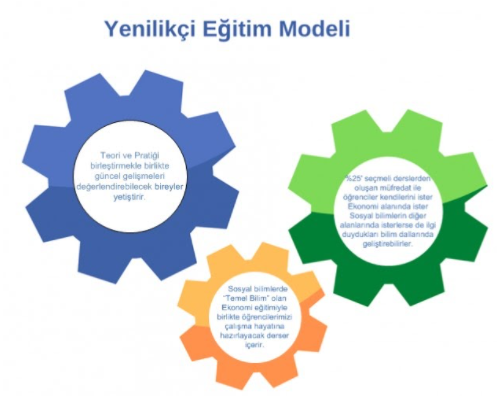
Students who successfully graduate from the Department of Economics undergraduate program have a wide range of job opportunities in the public or private sector. Especially national or multinational companies often benefit from the expertise of economists while implementing their economic activities. They can work in companies as economic/financial consultants or in different positions in departments such as sales and marketing. Graduates can also find employment opportunities in the headquarters and branches of private and public banks.
Apart from banks, they can be employed in all financial market institutions and organizations in positions such as experts, assistant experts, inspectors, financial advisors, accountants, managers and management candidates. After graduation, graduates who succeed in public institution exams are employed in public institutions and organizations such as the Central Bank of the Republic of Turkey, Ministry of Economy, Undersecretariat of Treasury, Competition Authority, Capital Markets Board and Banking Supervision and Regulation Agency with the title of economist. Graduates with advanced foreign language skills have the opportunity to work in international organizations such as the World Bank (WB), United Nations (UN), International Monetary Fund (IMF). At the same time, graduates who continue their master's and doctoral studies after the economics undergraduate program have the opportunity to pursue an academic career.
Vision
The vision of Yeditepe University Department of Economics is to be one of the leading departments of Economics in Turkey and the world with its education, training, scientific research and services to the society.
Mission
Our department is focused on adding value to society through education, research and service within the framework of continuous improvement principles. For this purpose:
Yeditepe Department of Economics offers undergraduate and graduate programs at contemporary international academic standards with the determination to educate individuals who are modern, enlightened and who have internalized universal values, who can understand and direct local and global economic developments, and who have leadership qualities.
It provides a working environment that supports the academic and professional development of its academic staff and the production and sharing of knowledge on national/international platforms.
It serves the society by cooperating with all kinds of national and international private businesses and public institutions and by supporting its students and faculty members to share their knowledge/experiences.
It maintains and reflects a contemporary, respectful, tolerant, innovative, entrepreneurial and participatory culture that supports personal development within the department, both among faculty members and students.
The Department of Economics started to provide education in 1996 with the establishment of our university. Our first graduates joined the working life in 2000. In 2001, when the move to the August 26 campus brought all faculties and departments of our university together, it enabled interdepartmental cooperation and interdisciplinary studies. Thus, the number of full-time faculty members increased and became suitable for the increasing number of students and the desired course diversification.
History
Our faculty members, on the one hand, focus on scientific studies, and on the other hand, they ensure that economics education is in line with changing conditions by developing new courses. Economics master's and doctoral education is carried out with "General Economics" and "Political Economy" programs. Until the end of 2015, 756 undergraduate, 10 graduate and 8 doctoral students graduated from our department.
Department Heads:
1996-2001 Prof. Dr. Önder Arı
2001-2007 Prof. Dr. F. Vural Savaş
2007-2013 Prof. Dr. M. Reşat Kayalı
2013-2015 Prof. Dr. Ferda Halıcıoğlu
2015-2017 Prof. Dr. V. Necla Geyikdağı
2017-2022 Prof. Dr. Ahmet Özçam
2022- Doç. Dr. Çağrı Levent Uslu
International Student Mobility: Erasmus and Other Exchange Programs
Our faculty, which has bilateral agreements with more than 100 higher education institutions abroad, attaches great importance to student mobility. In this context, the Department of Economics welcomes many students from universities all over the world every semester within the scope of Erasmus and exchange programs and sends students to these universities. Within the scope of these agreements, the current list of universities where the students of the Department of Economics can complete part of their education is given below.
For detailed information and to apply for international exchange programs, please visit the Yeditepe University International Office website or contact our department Erasmus coordinator Dr. Ayşe SEVENCAN.
Department Erasmus Coordinator

Assoc. Dr. Ayşe SEVENCAN
e-mail: ayse.sevencan@yeditepe.edu.tr
Inline: 3029
Office: FEAS - 506
Institutions we have agreements with (PDF)
| COUNTRY | CITY | UNIVERSITY | Web |
| Germany | Mainz | Johannes Gutenberg University | http://www.uni-mainz.de/eng/ |
| Germany | Ludwigshafen | Ludwigshafen University Applied Sciences | http://web.fh-lu.de/enindex.nsf/en/ludwigshafenun |
| Germany | Kassel | Universität Kassel | http://www.uni-kassel.de/uk/ |
| Austria | Graz | University of Graz | http://www.uni-graz.at/en/ |
| Belgium | Antwerpen | University of Antwerp | https://www.uantwerpen.be/en/ |
| Denmark | Aarhus | Business Academy Aarhus | http://www.baaa.dk/ |
| Frence | Nancy | Université De Lorraine | http://www.univ-lorraine.fr/ |
| Netherlands | Diemen | Inholland University Applied Sciences | http://www.inholland.nl/inhollandcom/ |
| Netherlands | Utrecht | University Applied Sciences Utrecht | http://www.international.hu.nl/ |
| Spain | Madrid | Universidad Autónoma de Madrid | http://www.uam.es/cs/ContentServer/en/home.htm |
| Italy | Benevento | Università degli Studi del Sannio | http://www.unisannio.it/ |
| Latvia | Riga | Baltic Psychology And Management Higher School | http://www.psy.lv/index.php |
| Lithuania | Vilnius | Mykolas Romeris University | http://www.mruni.eu/en/current_students/erasmus/ |
| Portugal | Lisbon | Universidade Técnica De Lisboa | http://www.ulisboa.pt/ |
The Bologna Process is a reform process developed by many international organizations to create compatible higher education areas in Europe, to develop certain standards in the academic field, to implement these standards and to minimize the differences in the education system. The main objectives of the Bologna Process include educational attainment, transparency, mobility of students and academic staff, and international recognition of higher education institutions. The Bologna Process, which is a student-centered program, enables students to continue their education life in a much more active and conscious way. Yeditepe University Bologna Coordination Commission carries out its activities within the framework of national and international qualifications. As a result of the work that has been going on at our university since 2006, in 2012, the qualifications of all existing programs were determined by taking into account the Turkish Higher Education Qualifications Framework (TYYÇ) and professional and current standards, and by associating them with the learning outcomes of the courses, the teaching has become more planned and qualified.
You can find the Economics Undergraduate Program Information Package here (PDF).
Yeditepe University Department of Economics offers its students the opportunity to double major or minor in many departments within the university. In this way, students can have a second diploma if they prefer, or they can get an additional certificate to their diploma by participating in a minor program in a different field they want to specialize in. Application criteria for double major and minor programs, program attendance and completion requirements are specified in the Yeditepe University Associate and Undergraduate Education and Training Regulations.
Yeditepe Economics Department does not limit its students to the existing Minor/Match agreements. If our student wants to do a DMP / Minor with a department other than the departments listed below, he/she can apply to the department coordinator and request a DMP / Minor agreement between the two departments. However, it should be noted that it is not possible to do a DMP / Minor with exceptional Faculties / Departments such as Faculty of Medicine, Dentistry, School of Nursing. In order to do a DMP in the Department of Economics or to do a DMP in another department while you are a student of the Department of Economics, you can contact the department's DMP / Minor coordinator, Dr. Hatice Kerra Geldi, Department of Economics.
Department Double Major and Minor Coordinator

Assist. Dr. Hatice Kerra Geldi
e-mail: hkerra@yeditepe.edu.tr
Inline: 1722
Office: FEAS- 514
Our department currently has DMP agreements with 17 different departments.
|
Faculty of Economics and Administrative Sciences |
Political Science and International Relations (English) |
| Political Science and International Relations (French) | |
| Business Administration | |
| Public Administration | |
| Information Systems and Technologies | |
| International Finance | |
| International Trade and Business | |
| Faculty of Computer and Information Sciences | Management Information Systems |
| Faculty of Engineering | Industrial and Systems Engineering |
| Civil Engineering | |
| Faculty of Arts and Sciences | Psychology |
| Mathematic | |
| Sociology | |
| Faculty of Fine Arts | Gastronomy and Culinary Arts |
| Fashion and Textile Design | |
| Faculty of Communication | Journalism |
| School of Applied Sciences | Real Estate Development and Management |
Q1: Can Yeditepe University help me with my department preference?
A1: As Yeditepe University, we will be pleased to host our prospective students at our school campus during our promotional periods, and we also provide support with the preference robot at the candidate student address on our website.
Q2: What does economics mean?
A2: Economics, as a word, is a social science that examines the production, consumption, and trade activities of goods and services that will meet the needs of people in order to continue their lives and how to meet unlimited human needs in the most effective way with scarce resources. Therefore, it examines all activities of people from production to consumption from a behavioral social perspective. Usually, the relationship with money comes to mind first, but money is only a means of payment. At the core of almost every activity of people and societies is the need to use a resource in an optimum (EFFECTIVE) way.
Q3: Why is it important to study economics?
A3: Economics is part of every aspect of our lives and is like a natural part of us. Studying economics helps us to better understand the world we live in, the government policies and businesses of a wide range of countries, the resource use of land, labor, and physical capital, and the importance of productivity. You can learn everything from how prices change in the markets for goods, services, employment, and money, to why income levels and living standards differ between countries. Economics has an impact on every aspect of life and on every group of people. This is why economists can conduct research on a wide range of social issues, from public economic policy, poverty, and income distribution, to environmental economics. On the other hand, societies' social reforms need to be supported by economic reforms. Studying economics helps us to become more competent citizens who are better able to decide how and when to carry out these reforms.
Q4: Does Yeditepe Economics Department have a Double Diploma agreement with Universities abroad? Do you send students abroad?
A4: There is a Joint Undergraduate Program Protocol (Double Diploma) in Economics between Yeditepe University and Huron University at Western Canada (Canada). In the 2020-2021 academic year, 5 paid students chose our program and filled the available quota. Students who choose this program will study the first 2 years at Yeditepe University and the 3rd and 4th years in Canada. The minimum GPA required for the scholarship for students coming to Canada is usually 80%.
Up-to-date information on fees can be found on this page for Huron University and on this page for Yeditepe University
Students who choose the Joint Undergraduate Program in Economics between Yeditepe University and Huron University at Western (Canada) should pay attention to the fact that the code of this program (Joint Undergraduate Program) is different from the code of Yeditepe University Department of Economics (English) program, and the code of the joint undergraduate program should be processed at the preference stage.
Q5: What is the purpose of Yeditepe University Department of Economics?
A5: Yeditepe University Department of Economics aims to educate individuals with critical thinking and ethical values who can analyze and interpret the economic developments and problems in Turkey and the world and the social consequences of these developments from a broad perspective by teaching students the logic and basic concepts of economics and who can independently produce solutions from an analytical perspective. We provide quality education to students who want to work in both private and public organizations or who want to pursue an academic career with our expert academic staff.
Q6: Which courses are offered at Yeditepe University Department of Economics?
A6: Click here for detailed information about the curriculum.
Yeditepe Economics Department aims to provide students with an analytical perspective as well as a full grasp of systematic and critical thinking through core economics courses such as International Political Economy, Global Economics, Economic Growth, Development, Turkish Economy, Money and Capital Markets, Monetary Economics, Public Finance and History of Economic Thought. Our quantitative courses such as statistics, mathematics, econometrics and statistical package programs and data collection aim to strengthen the analytical infrastructure of this theoretical perspective.
On the other hand, our program is supported by a total of 13 elective courses, 6 of which are Free and 7 of which are Economics, in order to enable our students to specialize in other fields of Social Sciences or in sub-specialty areas of Economics and to develop themselves in their areas of interest.
Q7: Why should I choose Yeditepe University Department of Economics? What is the difference of the department?
A7: Yeditepe University Department of Economics has an academic staff of 11 academicians in total with 3 full-time professors, 3 associate professors and 5 PhD faculty members who have studied at prestigious universities in Turkey and abroad and each of whom are experts in their fields. Economics education, as a basic science, constitutes the intersection point and the basis of disciplines such as political science and international relations, finance, public administration, business administration, psychology, sociology, anthropology. With the individual characteristics they develop in our active learning processes, our students become capable of analyzing current issues in economics and these intersecting fields from an academic, scientific and critical perspective and developing solutions. In the Project Course in the last year of the program, our students have the opportunity to prepare a research project together with their advisor faculty members, bringing together the knowledge they have gained during their four years of education and training and completing this knowledge with a rigorous, original and concrete project. They gain the ability to express their work effectively orally, in writing and visually and defend their thesis in front of a jury of 3 faculty members at the end of the semester.
In addition to the academic articles of our faculty members, we share our faculty members' thoughts on various current developments ranging from import dependency in the energy sector, environmental economics and cost/benefit analysis, development and development economics, women entrepreneurship and CBRT monetary policies in the series of ECONOMIC NOTES, which we publish on our department's website in a non-technical manner as a short verbal summary note on issues concerning the Turkish and world economy in general.
Q8: Does a student enrolled in the Economics program have the opportunity to do Double Major (DMP) and Minor?
A8: Yes. Since economics can be associated with many departments, we offer Double Major or Minor opportunities with many departments of our university in order to provide students of the Department of Economics with knowledge and skills in other disciplines in addition to their specialization in economics and to ensure that they grow as fully equipped individuals and increase their employment opportunities. In this way, students can, if they wish, graduate with two diplomas by studying a second department of their choice, or they can obtain an additional certificate to their diploma by doing a Minor in the department they prefer. In addition, Yeditepe Economics Department does not limit its students to the existing Double Major Minor agreements. If our student wants to do a Double Major / Minor with a department other than the departments listed below, they can apply to the department coordinator and request a Double Major / Minor agreement between the two departments. However, it should be noted that it is not possible to do a Minor with departments such as Faculty of Medicine and Dentistry. On the other hand, even if there is no existing DMP agreement, it is easy to make a DMP / Minor agreement with departments of faculties such as Faculty of Arts and Sciences, Faculty of Communication, Faculty of Commercial Sciences.